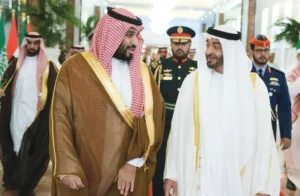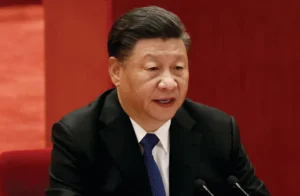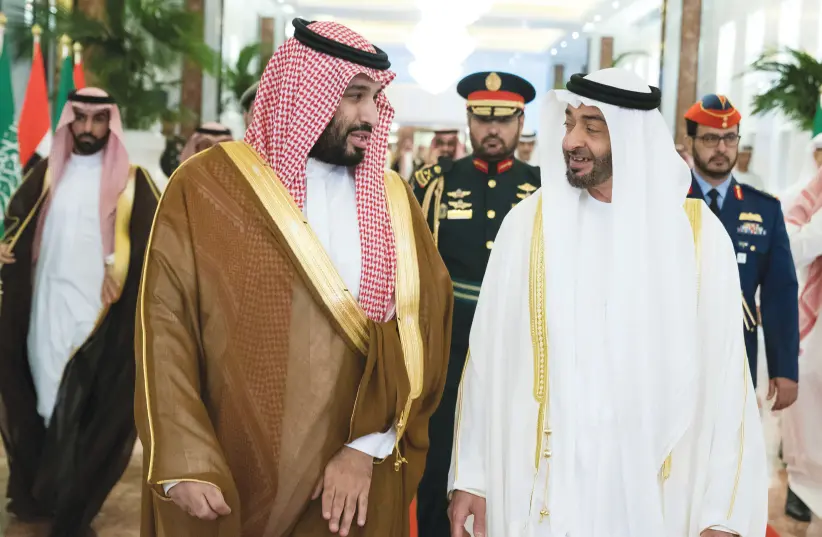Experts differ over whether Xi’s visit reflects the opinion in Riyadh that America has become a weaker ally.

Chinese President Xi Jinping will soon visit Saudi Arabia, perhaps even this week as media reports have indicated, a Saudi source confirmed to The Media Line, without giving a specific date.
This visit will be the Chinese president’s first overseas trip since the beginning of 2020.
He is expected to stop in Riyadh, Jeddah, and the planned megacity of Neom on the Red Sea coast.
The source expects that the visit “will witness the signing of more economic agreements on a number of axes, most notably energy and food security, in addition to more agreements in various fields of science and others.”
And the visit might see an agreement by the kingdom to sell oil to China in exchange for its yuan currency, in addition to military agreements.

The volume of trade between the two countries reached $87 billion dollars in 2021, with Saudi Arabia being the largest exporter of oil to China, surpassing Russia.
China implemented infrastructure projects in Saudi Arabia worth $40 billion in 2014-2019, with the two countries seeking to enhance economic cooperation through a meeting of the Saudi
Vision 2030 strategic framework and the Chinese Belt and Road Initiative.
Saudi Arabia and China’s relations
Ahmed al-Faraj, a Saudi professor of international relations, told The Media Line, “The upcoming visit, if it takes place, will have great implications, most notably for what Saudi-American relations are going through in terms of great coldness, which is reflected in Washington’s role in the region.”
“This visit will be a clear message that Saudi Arabia has strategic allies other than the United States of America and that it is a strong country that cannot be overcome in the Middle East,”
Ahmed al-Faraj, Saudi professor of International Relations
He added, “Chinese-Saudi relations are stable. They have not experienced any tremors but rather grow annually as China does not seek any military or sabotage role in the region, but rather searches for economic investments and projects, and treats Saudi Arabia as a true partner, which suits the Gulf states.
“This visit will be a clear message that Saudi Arabia has strategic allies other than the United States of America and that it is a strong country that cannot be overcome in the Middle East,” Faraj added.
He noted that the world is moving toward a multipolar power structure, given the weakness of European countries, the Russian-Ukrainian war, and especially the unprecedented weakness of the United States and its domestic and foreign policies.
“This is a real opportunity for China, and the countries of the Middle East can benefit greatly from it, especially since China was able to become one of the largest exporting countries in the world,” Faraj said.
Chinese businessman Wei Ma, an investor in the Gulf countries and a resident of the United Arab Emirates, told The Media Line, “We look forward to more economic opportunities in Saudi Arabia, as is the case for all Chinese investors, businessmen and companies.
“There are many economic opportunities in Saudi Arabia, and we hope that the upcoming visit of the Chinese president to Saudi Arabia will open more areas for mutual benefit between the two countries,” he added.
Adel Abdullah, a Saudi strategic analyst and international relations expert, told The Media Line, “The balance of global power is changing, but this has nothing to do with the Chinese president’s visit to Riyadh.
“There are always visits between Saudi Arabia and China at all levels. China is an important country and Saudi Arabia is a country that has strategic weight in the region, the world, and energy markets. The Saudi crown prince made a previous visit to China [in February 2019], and the Chinese president visited Saudi Arabia [in January 2016],” he said.
“Saudi Arabia is on the verge of more major projects, which need investments and partnerships with other countries, and technical cooperation is very important for the next stage,” he added.
“The world is also on the verge of major economic changes, and there will certainly be important discussions about the future economy of the two countries, and how to increase cooperation between them,” Abdullah continued.
“The media will certainly take advantage of this visit to try to link it to a chill in relations between Saudi Arabia and America, but this is not true. There were visits and continuous communication [with China] despite the strength of relations when President Donald Trump was at the helm in America,” he said.
“Saudi Arabia has expanded its strategic relations for a long time, and it has strategic relations with all friendly countries, and therefore this visit does not target anyone but rather the development of interests between the two countries and achieving benefit for them,” Abdullah said.
Mohammed al-Azmi, a Kuwaiti professor of economics, told The Media Line, “The Gulf countries have their currencies pegged to the dollar, and it is illogical for any country that links its currency to the dollar to try to destabilize its position.
“What some people say about selling oil in yuan is nothing but an attempt to get readers,” he added.
“China is Saudi Arabia’s biggest economic partner, and the trade exchange figures testify to this. There is a significant growth in the balance of trade exchange between the two countries, which is growing every year, and therefore additional economic agreements will benefit both countries, especially after the corona pandemic,” Azmi said.

